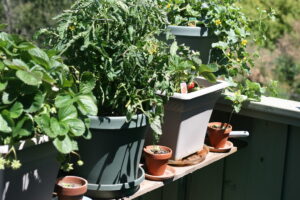
Discovering Biochar: A Boon for Gardens, Orchards, and Pollinators
Imagine a material that could supercharge your garden, help your fruit trees thrive, and turn your backyard into a haven for bees and butterflies. This isn’t a fantasy; it’s biochar. This powerful amendment is making waves in the gardening community, and for good reason. Let’s explore the wonders of biochar and how it can transform your green spaces.
Key Takeaways: Biochar’s Multifaceted Advantage
Biochar is not just another soil amendment; it’s a multifaceted tool for gardeners, urban farmers, and the environment. Here are the key points to remember:
- Biochar improves soil fertility, structure, and water retention, benefiting plants and pollinators alike.
- By sequestering carbon, biochar is a powerful force in the fight against climate change.
- Its use in sustainable agriculture supports healthier ecosystems and reduces the need for harmful chemicals.
- Biochar’s benefits are long-lasting, making it a smart investment for the future of gardening and the planet.
Defining Biochar and Its Historical Roots
Biochar is a rich, porous charcoal used in horticulture and agriculture to improve soil health and plant growth. It’s not a new invention; in fact, its use dates back centuries to the indigenous people of the Amazon Basin. They created a fertile soil known as ‘terra preta’ or ‘dark earth’ by incorporating charred organic materials into the ground. This ancient wisdom is now being rediscovered and embraced by modern gardeners and farmers alike.
- Enhances soil structure and fertility
- Boosts water retention in dry soils
- Provides a habitat for beneficial soil microbes
- Improves plant resilience against diseases
- Reduces the need for chemical fertilizers
Key Components and Production of Biochar
So, what goes into making biochar? It starts with biomass—organic materials like wood chips, agricultural waste, or even manure. These materials are then subjected to a process called pyrolysis, where they are heated to high temperatures in the absence of oxygen. This process creates a stable form of carbon that won’t easily break down, locking it away in the soil for potentially hundreds of years.
- Organic materials are used as the base for biochar
- Pyrolysis transforms the biomass into stable carbon
- The resulting biochar is rich in nutrients and micro-pores
- It can be made at various scales, from DIY setups to industrial operations
Boosting Soil Fertility: Biochar’s Role
When added to the soil, biochar acts like a sponge, holding onto nutrients and water that plants can then access when needed. This not only makes your garden more drought-resistant but also means you can cut back on watering and fertilizing. But that’s just the beginning. Biochar also provides a home for beneficial bacteria and fungi, essential partners for healthy plant growth.
Enhancing Nutrient Retention in Soil
One of the standout benefits of biochar is its ability to enhance nutrient retention in the soil. This is crucial for plant health and growth. Nutrients can easily be washed away by rain or irrigation, but biochar’s porous structure traps these nutrients, making them available to plants over a longer period. This slow-release effect means your plants get a steady diet of what they need to flourish.
- Reduces leaching of essential nutrients
- Increases cation exchange capacity (CEC) of soils
- Enables plants to access nutrients more efficiently
- Minimizes the need for synthetic fertilizers
- Supports the slow release of nutrients, preventing over-fertilization
By harnessing the power of biochar, you’re not just giving your plants a boost; you’re investing in the long-term health of your soil. And healthy soil means a thriving garden full of vibrant flowers, luscious fruits, and a bustling community of pollinators. Stay tuned as we dig deeper into the myriad ways biochar can benefit your green space and the environment.
Improving Soil Structure and Aeration
Good soil is the lifeblood of any garden, and biochar is like a breath of fresh air for compacted, lifeless soils. When mixed into the earth, biochar’s porous nature breaks up dense soil particles, creating space for air and water to flow. This improved aeration encourages roots to grow deeper and stronger, leading to sturdier plants that can reach the nutrients they need to thrive.
- Breaks up compacted soil, allowing roots to expand
- Increases oxygen availability for root respiration
- Promotes better drainage, reducing the risk of root rot
- Creates a more favorable environment for earthworms and other soil organisms
Interaction with Mycorrhizal Fungi
Mycorrhizal fungi are like the hidden heroes of the plant world, forming symbiotic relationships with plant roots. They extend their network into the soil, increasing the surface area for water and nutrient absorption. Biochar acts as a condominium for these fungi, offering them the perfect habitat to flourish. This partnership results in healthier plants that are better equipped to withstand stress and disease.
- Enhances the symbiotic relationship between fungi and plant roots
- Supports the fungi’s ability to mine nutrients from the soil
- Leads to improved plant growth and resilience
- Helps in the natural cycling of soil nutrients
Pollinator Prosperity: How Biochar Helps
Our buzzing friends, the pollinators, are vital to the success of our gardens and the broader ecosystem. Biochar’s role in creating a vibrant garden extends to these crucial creatures as well. By enriching the soil, biochar indirectly supports the health of the plants that pollinators rely on for food and habitat.
Supporting Diverse Pollinator Habitats
Healthy soil leads to healthy plants, and healthy plants provide a bounty for pollinators. Biochar-enriched soils produce a more diverse array of flowering plants, offering pollinators a rich tapestry of nectar and pollen sources. This diversity not only feeds pollinators but also encourages a more resilient pollinator population by providing a range of habitats and food sources throughout the growing season.
- Supports flowering plants that provide nectar and pollen
- Contributes to the creation of microhabitats within the garden
- Encourages a balanced ecosystem with a variety of pollinator species
Impact on Flowering Plants and Pollination
Flowering plants are the cornerstone of a pollinator-friendly garden, and biochar ensures they have everything they need to put on a spectacular show. The nutrients held in biochar-fed soils mean more vibrant blooms and a longer flowering season. This not only makes your garden a visual delight but also extends the window for pollinators to do their important work, leading to a more productive garden overall.
- Leads to more abundant and longer-lasting blooms
- Increases the success rate of pollination and fruiting
- Attracts a wider variety of pollinators with robust flowering plants
- Ensures a consistent food source for pollinators throughout the season
With biochar, we’re not just gardening; we’re cultivating an ecosystem. As we enrich our soil, we’re also laying the foundation for a thriving community of pollinators that will keep our gardens, orchards, and local environments buzzing with life.
Water Conservation and Biochar’s Efficiency
Water is a precious resource, and conserving it is a priority for any gardener. Biochar can play a significant role in reducing water usage, thanks to its ability to retain moisture in the soil. This not only means less watering for you but also a more resilient garden that can withstand periods of drought.
Improving Water Retention in Arid Conditions
In areas where water is scarce, biochar can be a game-changer. Its structure allows it to absorb and hold onto water much like a sponge, releasing it slowly over time as plants need it. This means that in arid conditions, where every drop counts, soils amended with biochar can maintain moisture levels that support plant growth, even during dry spells.
- Acts as a reservoir, holding water in dry soils
- Reduces the evaporation rate from the soil surface
- Helps plants access water during periods of drought
- Makes the most of rainfall and irrigation
Reducing Watering Frequency with Biochar Amendment
For the everyday gardener, biochar means less time spent with the hose and more time enjoying the fruits of your labor. By incorporating biochar into your soil, you’ll find that your watering schedule can be reduced significantly. Plants will have a steady supply of water available to them, which is especially beneficial during hot summer months or in regions with water restrictions.
- Decreases the need for frequent watering
- Ensures consistent moisture levels for plants
- Can lead to savings on water bills and conservation of local water resources
- Supports plant health even with irregular watering
Practical Application in Gardens and Orchards
Understanding the benefits of biochar is one thing, but knowing how to use it effectively in your garden or orchard is another. The practical application of biochar is straightforward, and with a few simple steps, you can start reaping its rewards. Whether you’re a hobbyist with a flower bed or an orchardist with acres of trees, biochar can be tailored to your needs.
Incorporating Biochar into Your Soil Management Regime
Introducing biochar into your garden starts with mixing it into your soil or compost. The recommended amount can vary, but a good rule of thumb is to aim for a 10% biochar to soil ratio. This can be done at the time of planting or worked into the soil around existing plants. Remember, a little goes a long way, and the benefits of biochar will last for years, making it a cost-effective addition to your gardening toolkit.
- Mix biochar with soil or compost before planting
- Apply a layer of biochar-enriched compost as a top dressing for existing plants
- Consider the specific needs of your plants and soil type when determining the right amount
- Use biochar in potting mixes for container gardening
By incorporating biochar into your soil management practices, you’re not only nurturing your garden but also contributing to a more sustainable and environmentally friendly way of gardening. Biochar’s long-lasting effects will ensure that your soil remains a vibrant, life-supporting system for years to come, with less work and more enjoyment for you.
Environmental Benefits Beyond Pollination
While biochar’s benefits for pollinators are clear, its environmental impact stretches even further. It’s a powerful ally in the fight against climate change and plays a vital role in sustainable agriculture. Let’s dive into the ways biochar is making a difference on a global scale.
Carbon Sequestration and Climate Change Mitigation
Biochar is a champion of carbon sequestration. By converting agricultural waste into a stable form of carbon and locking it into the soil, biochar keeps it from entering the atmosphere as carbon dioxide—a major greenhouse gas. This not only helps mitigate climate change but also rejuvenates the soil by increasing its organic content. It’s a win-win for gardeners and the planet.
- Transforms waste into a resource that combats climate change
- Stable carbon in biochar remains in the soil for centuries
- Reduces greenhouse gas emissions from decomposing organic matter
- Contributes to the global effort to reduce atmospheric carbon levels
Contributions to Sustainable Agriculture Practices
Sustainable agriculture is about meeting today’s food needs without compromising future generations. Biochar plays a key role here by reducing the need for chemical fertilizers, which can be harmful to the environment. It also promotes soil biodiversity and helps farmers adapt to changing climate conditions. With biochar, we’re not just growing plants; we’re growing a sustainable future.
- Transforms waste into a resource that combats climate change
- Stable carbon in biochar remains in the soil for centuries
- Reduces greenhouse gas emissions from decomposing organic matter
- Contributes to the global effort to reduce atmospheric carbon levels
Embracing biochar means joining a growing community of gardeners and farmers who are not just cultivating plants, but also nurturing the earth. It’s a simple step with profound implications, and it all starts in your garden.
In Conclusion
Biochar isn’t just a passing trend; it’s a return to an ancient practice that has the potential to revolutionize modern gardening and agriculture. Its benefits are extensive, from boosting soil fertility and structure to conserving water and supporting pollinators. Moreover, it plays a significant role in the global effort to combat climate change through carbon sequestration.
As gardeners, we have the power to make a positive impact on the planet, starting with our own backyards. Incorporating biochar into our gardening practices is a step towards a more sustainable and resilient future. It’s an investment in the health of our soil, our plants, and our environment.
So, whether you’re nurturing a small vegetable patch or tending to a sprawling orchard, consider biochar as your secret ally. It’s more than just an amendment; it’s a commitment to nurturing life in all its forms, above and below the ground. Happy gardening!
FAQ: Unraveling Common Queries About Biochar
As with any gardening innovation, questions abound. Let’s tackle some of the most common queries about biochar to help you understand how it can fit into your gardening practice.
What exactly is biochar?
Biochar is a form of charcoal that’s specifically designed for use in soil enhancement. It’s made by burning organic material from agricultural and forestry wastes (biomass) in a controlled process called pyrolysis, which results in a stable form of carbon that can endure in soil for thousands of years.
How does biochar benefit my garden soil?
Biochar benefits garden soil by improving its texture, fertility, and ability to hold water and nutrients. It provides a habitat for beneficial soil microbes, which are essential for nutrient uptake in plants. It also helps to buffer soil pH and can reduce the need for chemical fertilizers.
Can I make biochar at home?
Yes, you can make biochar at home using simple methods like a kiln or even a covered pit. However, it’s important to research and follow safe practices to ensure the process is done correctly and efficiently.
How much biochar should I add to my soil?
The amount of biochar you should add to your soil can vary depending on the soil type and the plants you’re growing. A general recommendation is to use a 5-10% biochar-to-soil ratio by volume. Start with a small amount and observe how your plants respond before adding more.
Is biochar safe for all plants?
Yes, biochar is generally safe for all plants. It’s inert and doesn’t contain any harmful chemicals. However, it’s always a good idea to test it on a small area of your garden first, especially if you’re making your own biochar, to ensure it’s been properly processed and is free of any residual harmful substances.
Does biochar help with carbon sequestration?
Indeed, one of the most exciting aspects of biochar is its ability to sequester carbon, helping to mitigate climate change. When organic matter decomposes, it releases carbon dioxide into the atmosphere. Biochar, however, stabilizes the carbon in the biomass, keeping it locked in the soil for centuries.
Will biochar wash away with rain?
No, biochar is designed to integrate into the soil structure and will not wash away with rain. Its porous nature allows it to absorb water, which helps to prevent runoff and soil erosion.
With these questions answered, it’s clear that biochar has a lot to offer. It’s a simple, natural solution that can have profound effects on your garden’s health and productivity, as well as the wider environment. By adopting biochar, you’re stepping into a more sustainable gardening future.



